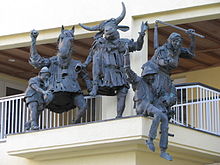Egga game
The Egga game is a carnival - customs in Sonthofen . The play is performed every three years on the so-called Spark Sunday .
origin
The Egga game goes back to a publication by the historian and writer Felix Dahn in 1863, which the "Heimatdienst Sonthofen" (a local and traditional society) took up in 1955. Since then, the home service has had the game performed every three years (most recently on March 10, 2019) on Funkensonntag . That is the first Sunday after Ash Wednesday , actually already the first Sunday of Lent ("Invocavit"). However, this day is the last day of the old carnival ("Farmer's Carnival "), which is still widely preserved in the Alemannic region . Dahn traced the game back to pre-Christian Alemannic customs. It is supposed to symbolize the struggle of people with the forces of nature. The Egga game is organized under the direction of the Heimatdienst. The Egga game is one of the few successful attempts by traditional associations and home keepers in the Allgäu to permanently revive former customs.
content
The performers, exclusively young men, are dressed up according to their roles and wear large face masks carved out of wood. Immediately before the game, they move as a group with musical accompaniment through the city center to the market hall, in front of which the Egga game is performed.
The game features the characters farmer, farmer's wife, Bue (boy), Föhl (girl), servant, maid, horses, cow, Molle (young cattle), cat, dog, sow (pig), Gockeler (rooster) and billy goat, a total of 17 contributors. The game is a pantomime , so nothing is spoken. Only the Herald comments on the event.
The farmer and the farmer begin to work in the field. After a while a witch appears, destroys the work and the food. The witch symbolizes the evil forces supposedly inherent in nature, which were previously held responsible for bad harvests and other misfortunes. The witch causes confusion, drives away the cattle and “just nudges every corner” (hence the name of the game). Thereupon she is hunted, caught and locked in a "prison" - a sauté trough. Through the subsequent symbolic burning in the bonfire , the witch, and in a broader sense also the pagan belief, is put to an end.
The masks are on display at Heimathaus Sonthofen for the rest of the year.
gallery
Eggaspiel fountain
A fountain designed by the sculptor Joseph Michael Neustifter from Eggenfelden in front of the Sonthofen town hall represents some of the play figures.











